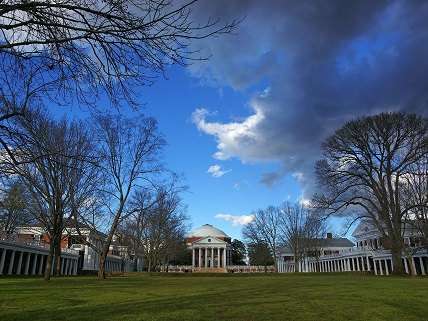Lessons of Rolling Stone's UVA Catastrophe: We Can't Prevent Rape If We're Deluded About It


Suppose Jackie's story was not so incredible. Suppose that premeditated, ritualistic gang rape was a plausible occurrence at the average college. Suppose that one in every five—or four, or three—female students found themselves in serious danger of assault the moment they set foot outside their dorm rooms. Suppose that America's campuses really did rival Somalia in terms of the violence faced by young women.
Would it be enough to merely place a moratorium on Greek activity, form a task force, and defend the actions of administrators who failed to report rape to the police, as University of Virginia President Teresa Sullivan has done (arguably in violation of the Constitution)?
Of course not.
On the other hand, suppose the details of Jackie's story were exaggerated, or in doubt. Suppose that premeditated, ritualistic gang rape was highly implausible. Suppose that cherry-picked statistics from a few unrepresentative studies were clearly masking an extraordinary decline in rape rates nationwide over the past few decades. Suppose the best available evidence suggested that campuses were, on the whole, safer for women than other environments. Suppose that campus sexual assaults were largely the work of a few sociopaths and nearly always the result of alcohol-induced incapacitation.
Wouldn't the supposed solution to the campus rape crisis look markedly different?
In a major magazine story that succeeds on all the levels Rolling Stone's failed, Slate's Emily Yoffe argues persuasively that we live in the latter world. Confusion about the prevalence of rape and its proximate causes—confusion that Rolling Stone has only worsened—has driven governments and universities to greatly mishandle sexual assault by mandating solutions that wrongly evaluate the scope of the problem while needlessly violating civil liberties, from due process to freedom of association.
Yoffe quickly cuts through the hyperbole about surging assault rates and discovers that college campuses aren't nearly as dangerous as we have let ourselves believe:
Being young does make people more vulnerable to serious violent crime, including sexual assault; according to government statistics those aged 18 to 24 have the highest rates of such victimization. But most studies don't compare the victimization rates of students to nonstudents of the same age. One recent paper that does make that comparison, "Violence Against College Women" by Callie Marie Rennison and Lynn Addington, compares the crime experienced by college students and their peers who are not in college, using data from the National Crime Victimization Survey. What the researchers found was the opposite of what Gillibrand says about the dangers of campuses: "Non-student females are victims of violence at rates 1.7 times greater than are college females," the authors wrote, and this greater victimization holds true for sex crimes: "Even if the definition of violence were limited to sexual assaults, these crimes are more pervasive for young adult women who are not in college."
Rennison, an associate professor at the School of Public Affairs at the University of Colorado Denver, recognized in an interview that her study goes against a lot of received wisdom. "Maybe that's not a really popular thing to say," she said, adding, "I hate the notion that people think sending kids off to college is sending them to be victimized."
We see this fear manifest itself all the time. After reading Yoffe's story, I instantly thought of Reason's Lenore Skenazy, who warns that many parents—as well as the state—have become myopic about the relative dangers their kids face. Skenazy has covered cases where police arrested parents for letting their children play outside by themselves, or wait in the car while mom grabbed groceries. Unrealistic fears about predators waiting around every corner to snatch and abuse kids have prompted the enactment of paranoid laws; these are bad for society and minimize child and parental autonomy, but do little to make children safer.
Consider Skenazy's video for Reason TV. She discovered that concerns about sex offenders abusing kids on Halloween are entirely misplaced, and laws that force registered sex offenders to turn off their lights or report to a facility during Halloween hours are cruel and needless. In most respects, kids are no less safe on Halloween. In fact, the one great danger to trick-and-treaters is being hit by a car. Skenazy's research suggests that taking the cops off sex offender patrol and putting them on crossing guard duty would be a far more effective use of police resources.
It's not that children face no danger; rather, certain dangers are exaggerated in people's minds (predators) and others minimized (car accidents). And so the policy designed to make children safer ends up focusing on the wrong thing.
It's the same with rape. Culture does not cause rape. Tasteless jokes do not cause rape. Fraternities are not universal rape factories. Rape is not occurring more frequently. Whatever happened to Jackie, it wasn't a Silence of the Lambs sort of ordeal as reported by Rolling Stone.
Which is not to say that nothing happened to Jackie, or that rape never happens, or that it has no cause or cultural enablers, or that all frats behave perfectly all the time. Of course rape happens, and it's a serious matter deserving of everyone's attention. The police should vigorously investigate accusations and prosecute offenders. Policies can and should be changed to diminish it. But this can only be done if people have a good sense of the scope of the actual problem.
And at the end of the day, obliterating that scope is perhaps the most costly consequence of Rolling Stone's disastrous abandonment of journalistic principles. The article's defenders cling—wrongly—to the notion that the world is brimming with Drews, and as such, all Jackies should automatically be believed without question. But some of the article's critics, who are right about its significant flaws, will nevertheless draw the incorrect conclusion that all accusers are liars. Neither outcome is good for addressing actual sexual assault.
The ubiquity of misleading statistics about rape and absurd policies designed to deter it—including, most notably, affirmative consent policies that make neo-Victorian requirements of students who want to have sex—betray a great deal of societal confusion on this issue. Rolling Stone has worsened the matter, and it's going to take lot more articles like Yoffe's to undo the damage.


Show Comments (77)